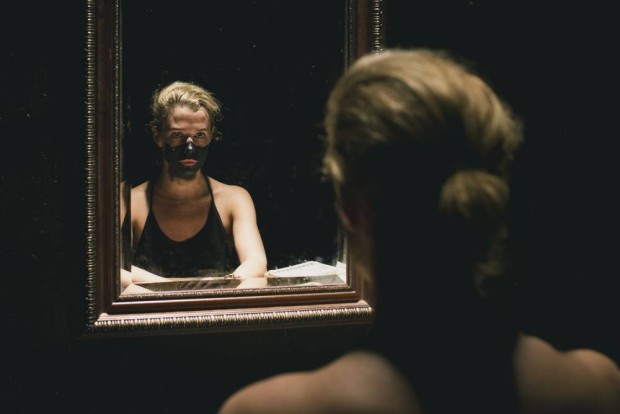Talks related to Samuel Beckett are an integral feature of the Happy Days Enniskillen International Beckett Festival. This year, the inaugural Billie Whitelaw Memorial Lecture in the Southwest College commemorated the late Beckett actress who passed away in December 2014.
Lisa Dwan, in a very real sense the heir to Whitelaw, had the honour of delivering the first Billie Whitelaw Memorial Lecture and gave a talk every bit as captivating as the interpretations of Beckett’s plays that have won her unreserved international acclaim.
In introducing Dwan, the festival’s Deputy Artistic Director Liam Browne quoted a New York Times review of Dwan’s trilogy of Not I, Footfalls and Rockaby, in which Ben Brantley described Dwan as “an instrument of Beckett, in that way saints and martyrs are said to be instruments of God.”
The language is interesting, as Whitelaw—who Dwan acknowledges as having paved the way for female actresses as regards Beckett’s latter works—also described herself as an instrument of Beckett. Nor would Brantley be the first to draw comparison between Beckett acolytes and religious adherents. Once you’re hooked on Beckett life is never quite the same again, as Dwan knows better than most.
Dwan’s commitment to Beckett’s art–her sacrifice and emotional surrender–was central to a fascinating talk that illuminated her craft as a boundary-pushing actress in relation to Beckett’s rigorous, exacting methodology.
What also emerged during Dwan’s talk was the ongoing impact of Whitelaw as a trailblazer and the debt that Dwan evidently feels towards the English actress. Whitelaw, of course, had Beckett’s guiding hand, but for Dwan the challenge post-Beckett has been to make the work relevant today.
Neither Whitelaw nor Dwan were trained actresses. Whitelaw, however, was able to offer something of much greater import to Beckett. “I gave him the whole of my gut” Dwan recounted Whitelaw saying across her kitchen table. Dwan, in her own way, has done exactly the same.
Dwan was a twelve-year old in Athlone when she first encountered Beckett – a BBC adaptation of Eh Joe. She spoke of “the arresting alchemy that chilled me to the bone.”
Perhaps Dwan was born to Beckett’s work. Chance, as it often does, played its part too, as Dwan’s career as a ballet dancer was cut short by injury, opening the path to an acting career.
When the script of Not I came through her door some years later Dwan immediately recognized the musical quality of Beckett’s rhythms – the “sheet music” of his lines. The task, Dwan admitted, was nevertheless daunting: “I felt I needed to dig deep and root out some kind of mental pickaxe to tackle this impenetrable intellectual mountain.”
Many people when approaching Beckett share similar reservations but the key note of Dwan’s talk was how she discovered the visceral and emotional import of Beckett’s work; how – not without toil – she unlocked the universal, elemental truths that make Beckett’s work so highly personal and thus so universal.
What drew Dwan to Not I, she told a rapt audience in the South West College, was her affinity with the cadences of Beckett’s language, the colloquialisms, the memories of pain, of isolation, the hilarity, the judgment and Christian pieties – all things, said Dwan that resonated deeply with her. “I heard home.”
Only an actor who has performed Not I could fully relate to what Dwan described as the “athletic mental discipline” required to remember the fragmented lines that gush from Mouth’s troubled mind, or the “huge emotional clarity” the piece demands of its interpreter.
There was a tremendous intensity in Dwan’s telling of the mental and emotional processes involved, and no little humour.
One day in Battersea Park, with the grass in her fingers as she localized memories in a rehearsal of Not I, Dwan recounted how at the performance’s end she slipped off her eye mask to be confronted by the sight of an audience of park-bench drunks.
They were clutching tins of booze to wipe out the very stuff emanating from Dwan’s speed-of-thought monologue. “We looked at each other,” recalled Dawn, “eye to eye in total acknowledgment.”
Dwan first performed Not I in 2005, since when she has gone on to astound audiences and critics alike around the world – including some audiences who had never heard of Beckett, others who had never even been to the theatre before.
People wherever they are from, stated Dwan, recognize Beckett’s cutting honesty. “I’ve witnessed time and time again how this deep, universal poetic truth speaks directly to us and about us.”
In order to bring as much of herself to Not I as possible Dwan shied clear of other performances. To this day, in fact, she has never seen another performance of the piece in the theatre. And while Dwan mightn’t have had Beckett, she had Whitelaw.
The two actress met shortly after Dwan’s first performance of Not I when the BBC invited them both for an in-conversation program about Beckett’s extraordinarily challenging monologue. ““We greeted each other like two shell-shocked war veterans”, Dwan recalled of their first encounter.
Little wonder, for rehearsing and performing Not I must be like going into the trenches. For starters, the sensory deprivation is complete. Blindfolded and in total blackout, the actor’s head is strapped to a board, the body immobilized in a harness. So rapid is the delivery of speech/thought that there’s no time to swallow during the nine-minute performance – twelve or thirteen minutes in Whitelaw’s day.
Only the mouth, suspended eight feet above the ground, is illuminated. To the audience, the mouth seems to oscillate and the effect is hallucinatory. Dwan described the experience as a terrifying, exhilarating flight, where any intrusive thoughts of her own can cause a momentary crash landing in alien territory.
One day Whitelaw called Dwan out of the blue to say she had to give her Beckett’s notes to Not I. As Dwan explained to the Southwest College audience she had no idea at that time whether she would ever perform Not I again. Whitelaw perhaps, knew differently.
Later that day Dwan found herself in Whitelaw’s home, sat across the kitchen table and reciting Not I as the elder woman moved her hands in time to the rhythms – conducting the music of the words, just as Beckett had done with Whitelaw. Dwan was keen to stress that Whitelaw in no way tried to impose her own vision of Not I on her. On the contrary, said Dwan, Whitelaw encouraged her at every step, at every dot and slash, to personalize the emotions in the words. Whitelaw, said Dwan, gave her “several keys to unlock parts of Beckett, or rather unlock parts of me that I could make available to Beckett.”
Through Whitelaw’s mentorship Dwan came to understand that Beckett didn’t want the actor’s craft – the gloss and spectacle – but rather the emotion. “Only he wanted all of it,” explained Dwan. “The real stuff. The guts.” The demands made on both body and mind performing Not I are extreme, yet paradoxically – given the sensory deprivation and physical restraints in place – Dwan spoke of the “liberating experience” of being freed from her body and becoming a manifestation of a vast consciousness.
If the demands of the role are high then so too are the costs. Whitelaw declared in 1977 that she would never perform Not I again, for fear of losing her mind. She also confided to Dwan that she had never quite recovered from the role. In a Q&A session in Belfast’s The MAC, following a performance of the trilogy of Not I, Footfalls and Rockaby in September 2014, Dwan suggested that she too may soon retire Not I from her repertoire. “It’s too taxing”, she stated then.
What could make more sense then, than to add Footfalls and Rockaby to Not I and perform them as a trilogy – a feat that had most likely never been done before. The idea had been that of Walter Asmus, Beckett’s long-standing collaborator and assistant director.
Dwan described Footfalls as one of the most exacting and least understood of Beckett’s works. In addition, the two characters, May, a woman in her forties pacing back and forth, and her ailing ninety-year old mother (off-stage) had never been embodied by one actress before.
Dwan eventually received permission from Beckett’s estate to interpret both roles on condition that the voices were absolutely distinct. Searching for the mother’s voice, Dwan related, was a grueling experience – hours a day, day after day.
Rehearsals with Asmus were particularly intense. He wouldn’t let Dwan get past the first six lines for days until she found the right tone, the right rhythm. Finally Dwan caught an invisible current, as she put it, which carried her through to the end.
For Dwan the key is to approach the texts like a dancer, using her dancer’s instincts to find the internal rhythms. Beckett’s highly technical pieces require extreme discipline and there is, said Dwan, “no scope either for excess or half-measures.”
If performing Not I alone is a draining, shattering experience, then Dwan likened the state she finds herself at the end of the trilogy to being in a another country, so great is her psychological and physical disorientation. Encouragingly for aspiring Beckett actors everywhere, Dwan ventured that there is plenty of scope for new and radical interpretations of Beckett’s work within the seemingly rigid boundaries of his stage directions.
Indeed, she sees it almost as an obligation. “This work can only be kept alive if each time the interpreter begins again making this work deeply personal, regardless of age, sex, nationality”, said the actress emphatically. Though Beckett lays bare the harsh realities of the human condition with an honesty that many find hard to bear, there’s a bravery in his characters’ endurance that Dwan clearly admires. “Beckett celebrates our defiance,” said the actress.
Honesty, bravery, endurance and defiance also aptly describe Dwan’s Beckett odyssey. And Whitelaw’s before her. Ian Patterson






